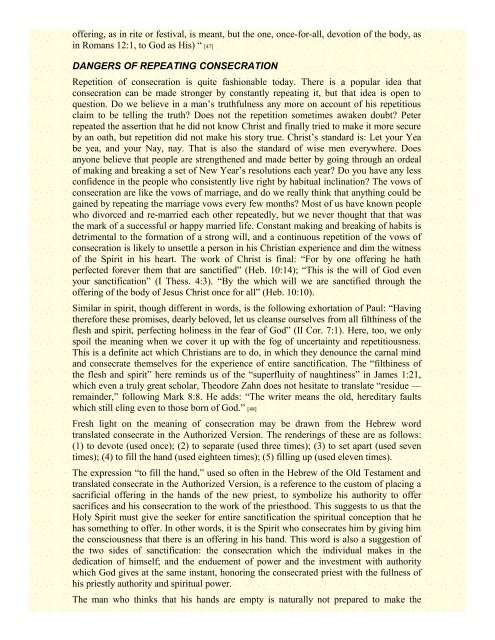2. The Meaning of Sanctification - Enter His Rest
2. The Meaning of Sanctification - Enter His Rest
2. The Meaning of Sanctification - Enter His Rest
Create successful ePaper yourself
Turn your PDF publications into a flip-book with our unique Google optimized e-Paper software.
<strong>of</strong>fering, as in rite or festival, is meant, but the one, once-for-all, devotion <strong>of</strong> the body, as<br />
in Romans 12:1, to God as <strong>His</strong>) “ [47]<br />
DANGERS OF REPEATING CONSECRATION<br />
Repetition <strong>of</strong> consecration is quite fashionable today. <strong>The</strong>re is a popular idea that<br />
consecration can be made stronger by constantly repeating it, but that idea is open to<br />
question. Do we believe in a man’s truthfulness any more on account <strong>of</strong> his repetitious<br />
claim to be telling the truth? Does not the repetition sometimes awaken doubt? Peter<br />
repeated the assertion that he did not know Christ and finally tried to make it more secure<br />
by an oath, but repetition did not make his story true. Christ’s standard is: Let your Yea<br />
be yea, and your Nay, nay. That is also the standard <strong>of</strong> wise men everywhere. Does<br />
anyone believe that people are strengthened and made better by going through an ordeal<br />
<strong>of</strong> making and breaking a set <strong>of</strong> New Year’s resolutions each year? Do you have any less<br />
confidence in the people who consistently live right by habitual inclination? <strong>The</strong> vows <strong>of</strong><br />
consecration are like the vows <strong>of</strong> marriage, and do we really think that anything could be<br />
gained by repeating the marriage vows every few months? Most <strong>of</strong> us have known people<br />
who divorced and re-married each other repeatedly, but we never thought that that was<br />
the mark <strong>of</strong> a successful or happy married life. Constant making and breaking <strong>of</strong> habits is<br />
detrimental to the formation <strong>of</strong> a strong will, and a continuous repetition <strong>of</strong> the vows <strong>of</strong><br />
consecration is likely to unsettle a person in his Christian experience and dim the witness<br />
<strong>of</strong> the Spirit in his heart. <strong>The</strong> work <strong>of</strong> Christ is final: “For by one <strong>of</strong>fering he hath<br />
perfected forever them that are sanctified” (Heb. 10:14); “This is the will <strong>of</strong> God even<br />
your sanctification” (I <strong>The</strong>ss. 4:3). “By the which will we are sanctified through the<br />
<strong>of</strong>fering <strong>of</strong> the body <strong>of</strong> Jesus Christ once for all” (Heb. 10:10).<br />
Similar in spirit, though different in words, is the following exhortation <strong>of</strong> Paul: “Having<br />
therefore these promises, dearly beloved, let us cleanse ourselves from all filthiness <strong>of</strong> the<br />
flesh and spirit, perfecting holiness in the fear <strong>of</strong> God” (II Cor. 7:1). Here, too, we only<br />
spoil the meaning when we cover it up with the fog <strong>of</strong> uncertainty and repetitiousness.<br />
This is a definite act which Christians are to do, in which they denounce the carnal mind<br />
and consecrate themselves for the experience <strong>of</strong> entire sanctification. <strong>The</strong> “filthiness <strong>of</strong><br />
the flesh and spirit” here reminds us <strong>of</strong> the “superfluity <strong>of</strong> naughtiness” in James 1:21,<br />
which even a truly great scholar, <strong>The</strong>odore Zahn does not hesitate to translate “residue —<br />
remainder,” following Mark 8:8. He adds: “<strong>The</strong> writer means the old, hereditary faults<br />
which still cling even to those born <strong>of</strong> God.” [48]<br />
Fresh light on the meaning <strong>of</strong> consecration may be drawn from the Hebrew word<br />
translated consecrate in the Authorized Version. <strong>The</strong> renderings <strong>of</strong> these are as follows:<br />
(1) to devote (used once); (2) to separate (used three times); (3) to set apart (used seven<br />
times); (4) to fill the hand (used eighteen times); (5) filling up (used eleven times).<br />
<strong>The</strong> expression “to fill the hand,” used so <strong>of</strong>ten in the Hebrew <strong>of</strong> the Old Testament and<br />
translated consecrate in the Authorized Version, is a reference to the custom <strong>of</strong> placing a<br />
sacrificial <strong>of</strong>fering in the hands <strong>of</strong> the new priest, to symbolize his authority to <strong>of</strong>fer<br />
sacrifices and his consecration to the work <strong>of</strong> the priesthood. This suggests to us that the<br />
Holy Spirit must give the seeker for entire sanctification the spiritual conception that he<br />
has something to <strong>of</strong>fer. In other words, it is the Spirit who consecrates him by giving him<br />
the consciousness that there is an <strong>of</strong>fering in his hand. This word is also a suggestion <strong>of</strong><br />
the two sides <strong>of</strong> sanctification: the consecration which the individual makes in the<br />
dedication <strong>of</strong> himself; and the enduement <strong>of</strong> power and the investment with authority<br />
which God gives at the same instant, honoring the consecrated priest with the fullness <strong>of</strong><br />
his priestly authority and spiritual power.<br />
<strong>The</strong> man who thinks that his hands are empty is naturally not prepared to make the









